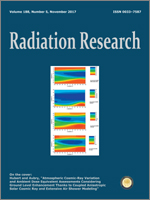A survivin-associated radio-adaptive response, characterized by increased radiation resistance or sensitization, was induced by exposure to 5 mGy of ionizing radiation and was correlated to the TP53 mutational status of exposed cells. Ten human cancer lines were investigated: colorectal carcinomas HCT116 and RKO [TP53 wild-type (WT)] and their respective TP53 null isogenic lines; breast adenocarcinomas MCF7 (TP53 WT) and MDA-MB-231 (TP53 Mut); lung carcinomas A549 (TP53 WT) and NCI-H1975 (TP53 Mut); and pancreatic carcinomas Hs766T (TP53 WT) and Panc-1 (TP53 Mut). Radiation induced (5 mGy) changes in the subsequent responses to 2 Gy in a multi-dose paradigm. Effects on radiation sensitivity were associated with changes in survivin's intracellular translocation to the cytoplasm (TP53 WT) or nucleus (TP53 Mut). Survival responses were determined using a colony forming assay. Intracellular localization of survivin was determined by ELISA and correlated with survival response. Two 2 Gy doses had minimal effects on the intracellular translocation of survivin. When preceded 15 min earlier by a 5 mGy exposure, survivin translocated to the cytoplasm in all of the TP53 WT cell lines, and to the nuclei in the TP53 null and Mut cells. All TP53 WT cells were protected (P < 0.001) by 5 mGy exposures, while Mut cells were sensitized (P < 0.001). HCT116 and RKO TP53 WT cells were admixed with their respective isogenic TP53 null counterparts in different proportions: 75% to 25%, 50% to 50% and 25% to 75%, respectively. All mixed confluent cultures expressed enhanced radio-sensitization (P ≤ 0.047) characteristic of TP53 Mut cells, which could be inhibited by their exposure to the antioxidant N-acetyl-l-cysteine (NAC) indicating a role for intercellular signaling by reactive oxygen species (ROS). ROS signaling in propagating the survivin-mediated response is involved in both intra- and intercellular communication processes.
How to translate text using browser tools
16 August 2017
TP53 Mutational Status and ROS Effect the Expression of the Survivin-Associated Radio-Adaptive Response
Jeffrey S. Murley,
Richard C. Miller,
Ralph R. Weichselbaum,
David J. Grdina
ACCESS THE FULL ARTICLE

Radiation Research
Vol. 188 • No. 5
November 2017
Vol. 188 • No. 5
November 2017




